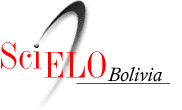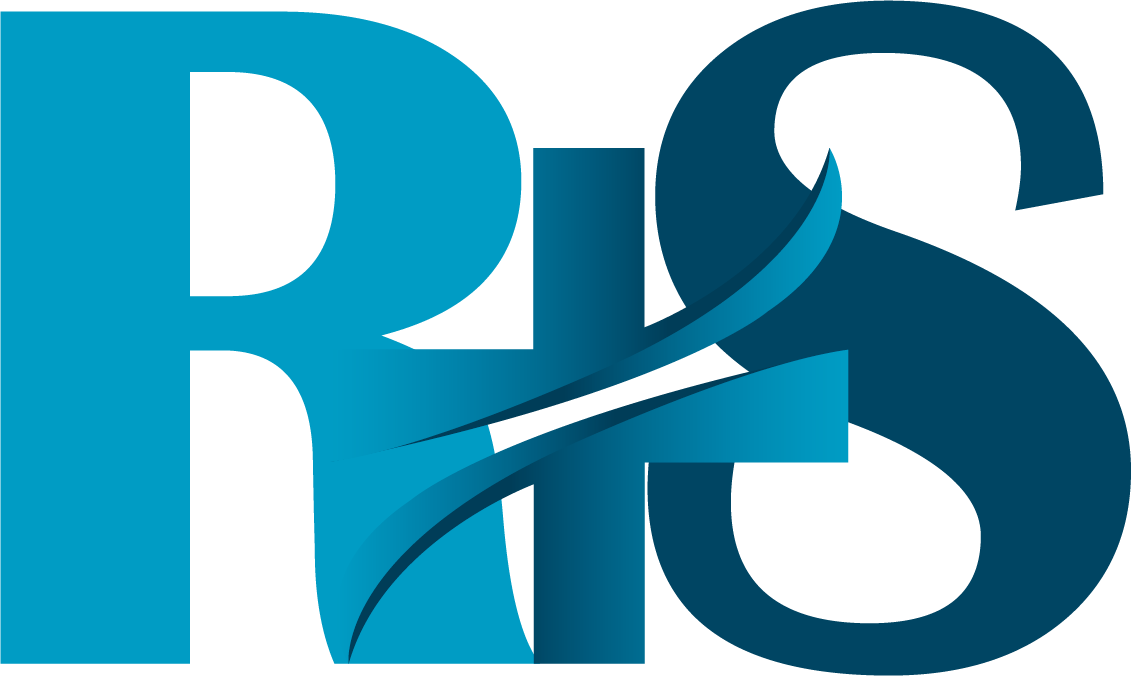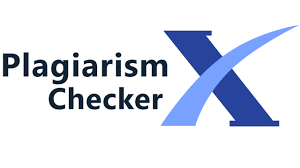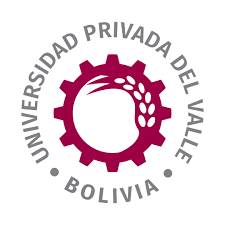Impact of nutritional status in early childhood: Comprehensive assessment of children aged 3 to 5 at the Maria Serrana Educational Center, Paraguay
DOI:
https://doi.org/10.52428/20756208.v20i48.1312Keywords:
childhood nutrition, overweight, eating habits, physical activityAbstract
Introduction: Nutritional status in early childhood is crucial for children's growth, development, and future health. In Paraguay, multiple factors such as parental education level, food availability, and parenting habits influence child nutrition. The present study aimed to assess the nutritional status of children aged 3 to 5 at the María Serrana Educational Center in Asunción, identifying dietary patterns, physical activity levels, and associated socio-familial factors. Material and methods: A mixed approach was used, with a descriptive, cross-sectional, and non-experimental design. The sample included 90 children and their parents. Semi-structured interviews, observation guides, and anthropometric measurements were conducted. The data were analyzed using descriptive and inferential statistics (chi-square and ANOVA). Results: The results revealed that 13% of the children were overweight or mildly obese, while 4% were underweight. High consumption of ultra-processed foods, low fruit and vegetable intake, and limited physical activity were observed. Low maternal educational level and lack of regular pediatric checkups were significantly associated with altered nutritional status. Discussion: From a theoretical and state-of-the-art perspective, the findings were discussed using the Orem and Pender framework, highlighting the need to empower families in self-care and health promotion. It is concluded that educational and community interventions are crucial to reverse the trend of childhood malnutrition and promote healthy habits from an early age.
Downloads
References
Hernández C, Arteaga A, Zapata N. Caracterización de la seguridad alimentaria y nutricional en menores que cursan su primera infancia. Rev Nutr Pediatr. [Internet] 2020 [consultado el 13 de junio de 2024];18(2):87-93. Disponible en: http://scielo.sld.cu/scielo.php?script=sci_arttext&pid=S0864-34662018000400169&lng=es.
Organización Mundial de la Salud. Un mayor enfoque en la nutrición dentro de los servicios de salud podría salvar 3,7 millones de vidas para 2025 [Internet]. Ginebra: OMS; 2019 sep 4 [Consultado 3 de julio de 2024]. Disponible en: https://www.who.int/es/news/item/04-09-2019-stronger-focus-on-nutrition-within-health-services-could-save-3.7-million-lives-by-2025
Castaño Tobón Laura Andrea, Molano Vargas Mariana, Varela Arévalo María Teresa. Dificultades de alimentación en la primera infancia y su relación con las prácticas parentales de alimentación. Rev. Mex. de trastor. aliment [Internet]. 2018 dic. [consultado el 5 de julio de 2024];; 9(2): 196-207. Disponible en: http://www.scielo.org.mx/scielo.php?script=sci_arttext&pid=S2007-15232018000200196&lng=es
https://doi.org/10.22201/fesi.20071523e.2018.2.489
Ministerio de Salud Pública y Bienestar Social. Encuesta Nacional de Salud y Nutrición. MSPBS; 2023.
United Nations Children's Fund (UNICEF). The State of the World's Children 2019: Children, Food and Nutrition: Growing well in a changing world. New York: UNICEF; [Internet] 2019. [Consultado el 15 de julio de 2024]. Disponible en: https://www.unicef.org/media/106506/file/The%20State%20of%20the%20World%E2%80%99s%20Children%202019.pdf
Bernal Regalado LO. Importancia del estado nutricional de la niñez en su desarrollo cognitivo. Alerta. [Internet] 24 de julio de2024 [consultado el 6 de octubre de 2024];7(2):191-197. Disponible en:
https://doi.org/10.5377/alerta.v7i2.17862
https://docs.bvsalud.org/biblioref/2024/07/1563179/vol7n2_esp_rn4_nutricionycognicion_072324.pdf
Villaizán Pérez C. Nutrición infantil: Presentación. Rev Pediatr Aten Primaria [Internet]. 2011 nov [consultado el 28 de agosto de 2024]; 13(Suppl 20): 19-23. Disponible en: http://scielo.isciii.es/scielo.php?script=sci_arttext&pid=S1139-76322011000400001&lng=es
Luna Hernández JA, Hernández Arteaga I, Rojas Zapata AF, Cadena Chala MC. Estado nutricional y neurodesarrollo en la primera infancia. Rev Cubana Salud Pública. [Internet] 2018 [consultado el 15 de junio de 2024];44(4):169-185. Disponible en: https://www.scielosp.org/pdf/rcsp/2018.v44n4/169-185/es
Pender NJ, Murdaugh CL, Parsons MA. Health Promotion in Nursing Practice. 6th ed. Boston: Pearson; 2011.
Orem DE. Nursing: Concepts of practice. 6th ed. St. Louis: Mosby; 2001.
Escandón FA, Bravo Salinas SE, Castillo Zhizhpón AA. Estado nutricional en niños del centro de educación inicial particular-Azogues, 2019. RECIMUNDO [Internet]. 6 nov. 2020 [consultado el 2 de julio de 2024];4(4):101-14. Disponible en: https://recimundo.com/index.php/es/article/view/930
https://doi.org/10.26820/recimundo/4.(4).noviembre.2020.101-114
Robles Larreta J. Factores que influyen en el estado nutricional de los niños de 1-5 años en Ecuador. Más Vita. Rev. Cienc. Salud [Internet]. 30 de septiembre de 2022 [consultado el 20 de septiembre de 2024]; 4(3):145-59. Disponible en: https://acvenisproh.com/revistas/index.php/masvita/article/view/423
https://doi.org/10.47606/ACVEN/MV0138
Calceto-Garavito M, Torres L, González E. Estado nutricional y desarrollo cognitivo en la primera infancia. Rev Colomb Nutr Hum. [Internet] 2019 ago [consultado el 18 de octubre de 2024];14(1):22-31. Disponible en: http://scielo.senescyt.gob.ec/scielo.php?script=sci_arttext&pid=S2631-25812019000200050&lng=es.
Herrán Murillo YF, Varela Arévalo MT. Hábitos de alimentación infantil y su relación con las prácticas y conocimientos nutricionales parentales. Rev Chil Nutr. [Internet] 2023 dic [consultado el 25 de septiembre de 2024];50(6):617-626. Disponible en: http://dx.doi.org/10.4067/S0717-75182023000600617
https://doi.org/10.4067/s0717-75182023000600617
Sanabria Marta Cristina, Peralta Luján Eumelia. Evaluación nutricional de niños menores de cinco años de edad durante la estancia hospitalaria en un Servicio de Salud de referencia. An. Fac. Cienc. Méd. (Asunción) [Internet]. 2021 [consultado el 3 de septiembre de 2024]; 54(2): 33-42. Disponible en: https://doi.org/10.18004/anales/2021.054.02.33
https://doi.org/10.18004/anales/2021.054.02.33
Asociación Española de Pediatría de Atención Primaria. Curvas OMS [Internet]. Madrid: AEPap; [fecha de publicación desconocida] [consultado el 3 de septiembre de 2024]. Disponible en: https://www.aepap.org/sites/default/files/curvas_oms.pdf
Fondo de las Naciones Unidas para la Infancia (UNICEF). Crece la ola de sobrepeso en la niñez. ¿Demasiado tarde para revertir la marea en América Latina y el Caribe? [Internet]. UNICEF; 2023. [Consultado el 3 de agosto de 2024]. Disponible en: https://www.unicef.org/lac/media/43026/file/Reporte%20sobrepeso%20ninez%20america%20latina%20caribe%202023%20UNICEF.pdf%20.pdf
Ávila-Alpirez Hermelinda, Gutiérrez-Sánchez Gustavo, Martínez-Aguilar María de la Luz, Ruíz-Cerino Juana María, Guerra-Ordoñez Jesús Alejandro. Conducta y hábitos alimentarios en estudiantes escolares. Horiz. sanitario [Internet]. 2018 dic [consultado el 15 de septiembre de 2024];17(3): 217-225. Disponible en: http://www.scielo.org.mx/scielo.php?script=sci_arttext&pid=S2007-74592018000300217&lng=es
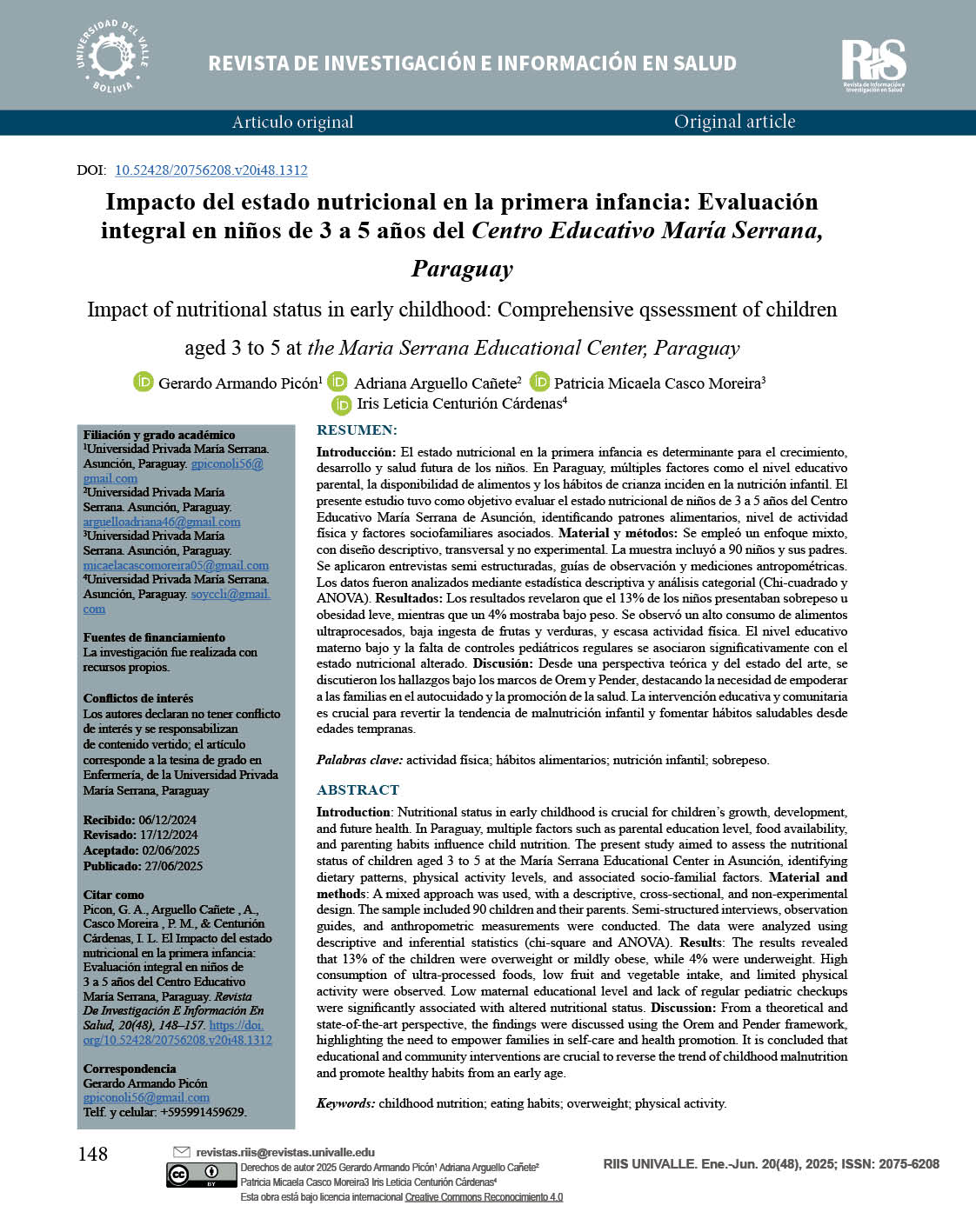
Downloads
Published
How to Cite
Issue
Section
License
Copyright (c) 2025 Gerardo Armando Picon, Adriana Arguello Cañete , Patricia Micaela Casco Moreira , Iris Leticia Centurión Cárdenas

This work is licensed under a Creative Commons Attribution 4.0 International License.
Authors who publish with this journal agree to the following terms:
- Authors retain copyright and grant the journal right of first publication with the work simultaneously licensed under a Creative Commons Attribution License 4.0 that allows others to share the work with an acknowledgement of the work's authorship and initial publication in this journal.
- Authors are able to enter into separate, additional contractual arrangements for the non-exclusive distribution of the journal's published version of the work (e.g., post it to an institutional repository or publish it in a book), with an acknowledgement of its initial publication in this journal.
- Authors are permitted and encouraged to post their work online (e.g., in institutional repositories or on their website) prior to and during the submission process, as it can lead to productive exchanges, as well as earlier and greater citation of published work.







